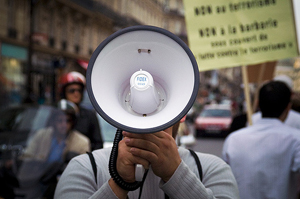3 phrases public health advocates should use with caution — or not at all
by: Heather Gehlert
posted on Wednesday, October 01, 2014
Language matters. Words have histories and meanings and connotations that can open people up to new ideas and move them to action — or reinforce old ways of thinking. The words we use activate frames, which are mental structures that allow us to take in information, categorize it and derive meaning from it based on what we already know — or think we know — about the way the world works.
 As we at BMSG often tell advocates, “Once activated, frames trigger emotions, associations, values, judgments, and causal explanations. They create tracks for a train of thought. And once on that track, it’s hard to get off.”
As we at BMSG often tell advocates, “Once activated, frames trigger emotions, associations, values, judgments, and causal explanations. They create tracks for a train of thought. And once on that track, it’s hard to get off.”
With that in mind, here are three common phrases that may be undermining advocates’ best efforts to make the case for sound public health policy:
This policy is not [fill in the blank].
Earlier this year, I read a blog about California’s bold move to put warning labels on sugary drinks. To demonstrate support for the bill and for similar public health efforts, the author wrote, “Public health policy is not about America becoming a communist, or even socialist state.” Yet, taking the reader on a mental detour toward socialism only moves us further from our understanding of why public health policy is important.
As my colleague Fernando Quintero has written, “By raising the precise frames we are intending to counter, even if only to refute them, we are creating hurdles we now must jump over. Moreover, we may be suggesting these arguments to those who had not yet considered them.” The next time you or your organization wants to make the case for a policy that would improve the public’s health, stay focused on what it is, not what it isn’t. The opposition has plenty of opportunities to do that for you.
Food environment, built environment, beverage environment — you get the idea.
We’re as guilty as anyone for overusing the word “environment.” To be sure, our environments affect our health, and if our goal is to change public policy in ways that support our collective health, we have to make those environments visible. Unfortunately, using the word isn’t necessarily the best way to do that. Even though “environment” is accurate, the trouble is that many people still think of the environment as our natural surroundings — trees, grass, water and air.
Over time, its repeated use may lead to a new understanding of its meaning to include social environments. In the meantime, to make sure you’re not diluting your message (particularly when talking with reporters or others not already steeped in public health lingo), try substituting or supplementing generic phrases like “food environment” with a vivid description of what you mean. Whether it’s neighborhoods overflowing with fast food outlets or junk food marketing strategically placed at kids’ eye-level in the supermarket, paint a picture of the surroundings you want to change. Use images and active language to show that those surroundings are the result of policy decisions that could have been made differently. As our director, Lori Dorfman, often says, “Never say furniture when you can say chair.”
Make the healthy choice the easy choice.
This one attempts to reframe the notion of choice and has a nice snap to it. Why, then, might advocates want to rethink it? Although advocates’ goal with this phrase may be to bridge individual behavior with the context it happens in, without making that context explicit, that bridge falls short of taking us where we need to go, as it reinforces the idea that choices are made by people, rather than shaped by our surroundings. It also triggers the dominant cultural narrative of rugged individualism, which contends that people are masters of their own destinies and can control their health outcomes if they simply make the right choices.
Instead of taking the risk of unintentionally cuing up the opposition’s argument, it may be more effective to take the focus off of individuals making choices and put it on the barriers that undermine people’s efforts to be healthy. In other words, shift the frame from a portrait to a landscape so that people can more clearly see why policy interventions are needed.
What do you think about these phrases? Do you use them? What are some other common words or expressions that public health advocates should use with caution or use more often?



